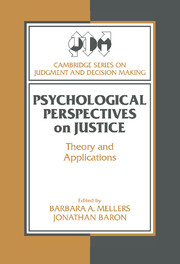Book contents
- Frontmatter
- Contents
- Series preface
- Contributors
- Part I Introduction
- Part II Psychological perspectives
- Part III Economic perspectives
- Fairness in groups: Comparing the self-interest and social identity perspectives
- Heuristics and biases in equity judgments: A utilitarian approach
- Trade-offs in fairness and preference judgments
- Information, fairness, and efficiency in bargaining
- Part IV Variations in perspectives on justice
- Part V Policy perspectives
- Part VI Conclusion
- Name index
- Subject index
Trade-offs in fairness and preference judgments
Published online by Cambridge University Press: 24 October 2009
- Frontmatter
- Contents
- Series preface
- Contributors
- Part I Introduction
- Part II Psychological perspectives
- Part III Economic perspectives
- Fairness in groups: Comparing the self-interest and social identity perspectives
- Heuristics and biases in equity judgments: A utilitarian approach
- Trade-offs in fairness and preference judgments
- Information, fairness, and efficiency in bargaining
- Part IV Variations in perspectives on justice
- Part V Policy perspectives
- Part VI Conclusion
- Name index
- Subject index
Summary
At the heart of many debates about distributive justice is the widely assumed trade-off between equality and efficiency (Okun, 1975). In the present chapter, equality refers to the distribution of income within a society. Equality increases whenever income variability is reduced. Efficiency refers to the goods and services that result from a given input – production, physical capital, or human labor. Efficiency increases whenever society produces more from the same input. Trade-offs between equality and efficiency occur because increases in one often lead to decreases in the other. An egalitarian society satisfies basic needs by establishing programs that redistribute wealth. But those programs can reduce efficiency when they introduce bureaucratic waste or diminish financial incentives. A reduction in efficiency can lead to fewer investments, fewer jobs, and declining productivity.
Theories of distributive justice
Is there an ideal point along the equality–efficiency continuum? Political and moral philosophers have articulated a number of positions about what constitutes justice and how to arrive at just distributions of resources and rewards. These positions place differential emphasis on equality and efficiency.
Utilitarians believe that society should be arranged to maximize the total (or sometimes average) utility of all individuals (Bentham, 1961/1789). If utility is identical to profit, then profit maximization occurs when efficiency is greatest. This version of utilitarianism might emphasize efficiency over equality. On the other hand, if utility is a negatively accelerated function of income, the poor benefit more from any given dollar.
- Type
- Chapter
- Information
- Psychological Perspectives on JusticeTheory and Applications, pp. 138 - 154Publisher: Cambridge University PressPrint publication year: 1993
- 8
- Cited by



